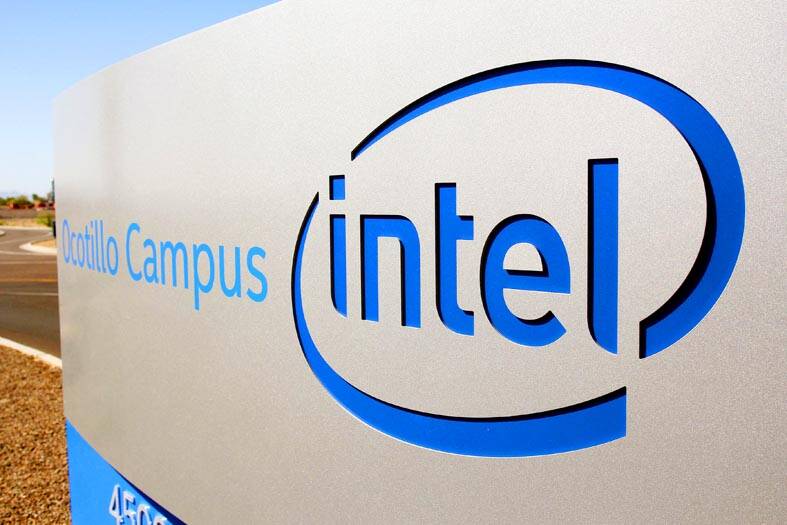Intel Corp chief financial officer Dave Zinsner said that a formal separation of the company’s factory and product development divisions is an open question that would be decided by the chipmaker’s next leader.
Zinsner, who is serving as interim co-CEO following this month’s ouster of Pat Gelsinger, made the remarks on Thursday at the Barclays technology conference in San Francisco alongside co-CEO Michelle Johnston Holthaus.
Intel’s struggles to keep pace with rivals — along with its deteriorating financial condition — have spurred speculation that the next CEO would make dramatic changes. That has included talk of a split of the company’s manufacturing and product design operations.

Photo: Reuters
“That’s an open question for another day,” Zinsner said in response to an analyst question.
The two units are already separated operationally, with different oversight and accounts, he said.
Gelsinger, who served as CEO from 2021 until last week, had maintained that the two main parts of the company were better kept together.
Johnston Holthaus said that access to leading production technology is an advantage for Intel’s products.
“So pragmatically, do I think it makes sense that they’re completely separated and there’s no ties?” she said. “I don’t think so, but someone will decide that.”
The shares gained 3.3 percent to US$20.78 in New York. They had plunged 60 percent through Wednesday’s close.
The executives broke with their predecessor’s more bullish messaging and emphasized that it would take time to fix Intel’s competitiveness and finances. They pointed to progress in personal computer chips, but also struggles ahead in data center products. Intel’s outsourced manufacturing effort, which involves making chips for outside clients, is another challenge.
Management would focus less on talking about “early indications of success” and more on concrete achievements, Zinsner said.
They also would dispense with giving “meaningless” long-term total deal value predictions for the company’s outsourced production efforts, he added.
Johnston Holthaus said that Intel needs to invest more in its products and is willing to deal with near-term down years to make sure it has offerings that would be more competitive in the long run.
Johnston Holthaus, known internally as “MJ,” also said that rival Advanced Micro Devices Inc has done a better job of providing their shared customers with data center products they want.
Next year, the executive would focus on trying to halt the market share loss that Intel has suffered, she said. As part of last week’s shake-up, Johnston Holthaus also took on the role of product CEO, putting her at the heart of that effort.
In artificial intelligence accelerator chips, where Nvidia Corp has taken a dominant role, Intel has struggled as well.
The company’s Gaudi chip is difficult to use, Johnston Holthaus acknowledged.
Intel is now focusing on more generic graphics chip offerings that would not be great at first, but would be rapidly updated to make them competitive, she said.

GREAT SUCCESS: Republican Senator Todd Young expressed surprise at Trump’s comments and said he expects the administration to keep the program running US lawmakers who helped secure billions of dollars in subsidies for domestic semiconductor manufacturing rejected US President Donald Trump’s call to revoke the 2022 CHIPS and Science Act, signaling that any repeal effort in the US Congress would fall short. US Senate Minority Leader Chuck Schumer, who negotiated the law, on Wednesday said that Trump’s demand would fail, while a top Republican proponent, US Senator Todd Young, expressed surprise at the president’s comments and said he expects the administration to keep the program running. The CHIPS Act is “essential for America leading the world in tech, leading the world in AI [artificial

DOMESTIC SUPPLY: The probe comes as Donald Trump has called for the repeal of the US$52.7 billion CHIPS and Science Act, which the US Congress passed in 2022 The Office of the US Trade Representative is to hold a hearing tomorrow into older Chinese-made “legacy” semiconductors that could heap more US tariffs on chips from China that power everyday goods from cars to washing machines to telecoms equipment. The probe, which began during former US president Joe Biden’s tenure in December last year, aims to protect US and other semiconductor producers from China’s massive state-driven buildup of domestic chip supply. A 50 percent US tariff on Chinese semiconductors began on Jan. 1. Legacy chips use older manufacturing processes introduced more than a decade ago and are often far simpler than

Hon Hai Precision Industry Co (鴻海精密) yesterday said that its research institute has launched its first advanced artificial intelligence (AI) large language model (LLM) using traditional Chinese, with technology assistance from Nvidia Corp. Hon Hai, also known as Foxconn Technology Group (富士康科技集團), said the LLM, FoxBrain, is expected to improve its data analysis capabilities for smart manufacturing, and electric vehicle and smart city development. An LLM is a type of AI trained on vast amounts of text data and uses deep learning techniques, particularly neural networks, to process and generate language. They are essential for building and improving AI-powered servers. Nvidia provided assistance

Gasoline and diesel prices this week are to decrease NT$0.5 and NT$1 per liter respectively as international crude prices continued to fall last week, CPC Corp, Taiwan (CPC, 台灣中油) and Formosa Petrochemical Corp (台塑石化) said yesterday. Effective today, gasoline prices at CPC and Formosa stations are to decrease to NT$29.2, NT$30.7 and NT$32.7 per liter for 92, 95 and 98-octane unleaded gasoline respectively, while premium diesel is to cost NT$27.9 per liter at CPC stations and NT$27.7 at Formosa pumps, the companies said in separate statements. Global crude oil prices dropped last week after the eight OPEC+ members said they would